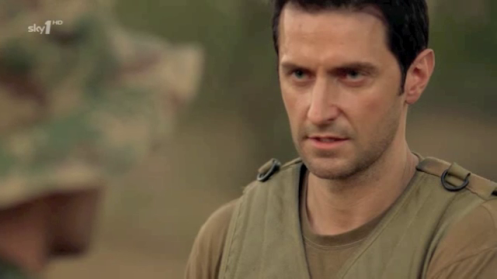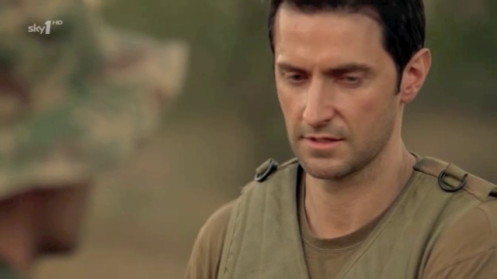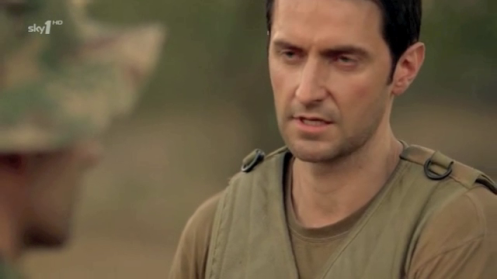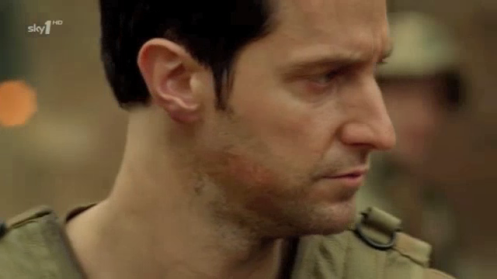Richard Armitage + John Porter status games in Strike Back: Origins 1.4 & 1.5
[Continued apologies for being a week behind.]
So much was going on last weekend, and I feel a bit silly going over this since I missed the date, but my observations on this theme in 1.5 are perfunctory, because there aren’t that many Collinson / Porter encounters, and I can’t possibly write about 1.6 — which has a really interesting, important, definitive status competition along with its resolution — without having discussed these exchanges. So here’s the missing post, for what it’s worth, with a discussion of my dissatisfaction with 1.5 appended to the end.
[all caps are mine.]
***

“It’s Porter,” John Porter (Richard Armitage) informs Col. Tshuma, just before he finishes him off, at the end of episode 1.4 of Strike Back.
***
From the first to the third episodes of Strike Back: Origins, we followed the status competition of our protagonist, John Porter (Richard Armitage) with Hugh Collinson (Andrew Lincoln), the man who ended his career and in consequence, seriously disrupted his life. In episode 1, Porter ended up one down, but used the same body language in episode 2 to move up. In episode 3, we again saw Porter toying with his status, playing a poker game around knowledge that Porter has (that a British soldier killed his comrades) and Collinson is uncertain that he has. We discussed how Armitage used timing in order to make Collinson squirm (and then I added the point that the flashback scene makes Collinson’s sudden status drop seem more intelligible to the viewer).
At the end of episode 3, Porter has broken Felix Masuku (Shawn Parkes — with whom Armitage worked on Miss Marie Lloyd) out of prison. The getaway vehicle promised to him by his colleagues is missing, but the two fugitives manage nonetheless — unbelievably — to escape. Porter drives to a shantytown in Harare, where, the audience is notified via flashback, Porter had actually planned to execute Masuku. Masuku talks him out of it by insisting that he was framed, and by pointing out the incongruities in Porter’s treatment by his own colleagues. At the beginning of episode 4, the two get underway. When Porter informs Layla that he needs transport for Masuku, he’s told to complete the mission (a slight plot incongruity; apparently Layla’s been brought up to speed even though she wasn’t shown in the flashback). Tracked aggressively by Zimbabweans under the leadership of Colonel Tshuma (David Harewood, with whom Armitage had worked in the third series of Robin Hood), the men undertake a journey toward the South African border and safety, but not before encountering a nun, Sister Bernadette (Sibulele Gcilitshana) and her orphanage. When Masuku sacrifices their position of safety to prevent the rape of an orphan, Porter is forced to intervene to free the nun and her charges from the influence of criminals who traffic in refugees. Porter is wounded during this intervention, and the soldiers stay behind to assure that Tshuma and Co. don’t target the fleeing orphans. Their last stand is aided by the deus ex machina appearance of Collinson, who charges in with South African troops — though Porter’s abandonment outside the prison makes it clear that Masuku’s the reason Collinson does so. Masuku flees just as Collinson and Co. materialize.
***

Felix Masuku (Shawn Parkes) and John Porter (Richard Armitage) catch their breath and watch a local tracker escape after fending off an attack at the orphanage in Strike Back 1.4.
***
I loved this episode for its depiction of Porter as reluctant, many-shaded “rescuer.” The juxtaposition between views of Porter as ready to give his life for strangers on the one hand, but equally prepared to neglect his family to do so on the other, hit me hard when I saw the episode the first time. Also, who can dislike watching Richard Armitage rescue cute little children in danger? Still, I had a lot of other problems with it, mainly the way that given what the viewer knows by the end of 1.3 and the way we learn it — through Porter’s own eyes, by watching Porter’s own experiences– it’s impossible for me to believe that Porter maintains any trust in Collinson. Armitage has to play throughout, however, as if Porter’s on the fence or uncertain about whether his Section D comrades are reliable, even as the viewer, who experiences everything with him, is not. This a gargantuan task and given the relatively slow pace with which the framing plot (Porter’s relationship with Collinson and his past) proceeds, Armitage has to make Porter do an awful lot of “blank” looking that is hard to reconcile with the personal-political intelligence of a man skilled enough to carry out a prison breakout on this kind of scale and roll with the punches so successfully in every unanticipatedly challenging situation.
But, in any case, the status conflict. So, Collinson rides in with the cavalry. Here’s the scene, again:
The scene opens by contrasting a bloody Porter, looting the weapon of a dead Zimbabwean, with Collinson’s posturing as if he’s actually done something other than show up with troops. (Random cultural question — is the way that these guys always gesture with their hands something to do with English manners and not pointing? It always surprises me when I see it. It makes them looks so genteel. An American would just point.) Porter enters direct interaction with Collinson at 0:11, and the look on his face makes it look like Porter’s going to tell Collinson the game is up — that he knows Collinson is trying to get him killed.
The Zimbabwean colonel makes a brief reappearance, winging Collinson, and Porter rescues Collinson once again by killing Tshuma. As Porter turns back to Collinson at 0:50, however, he seems to suffer adrenaline loss. He’s suddenly conscious of his wounds and draws his body in around his stomach. Collinson, too, is holding his arm. He begins the exchange by asking where Masuku is with a somewhat skeptical look on his face.
***
***
Again, we think Porter is going to let it out, but he doesn’t, offering an excuse in a very macho, dry, almost ironically weary tone, with the accompanying look. You need to really look at the vid a few times right around 0:59-1:00 to see this, along with the hearing the tone of his reply, which is given from off-camera.
***
***
Armitage delivers a nice performative contradiction here — Porter giving Collinson the eyes on “sincerity” look, undercutting it with the dry explanation of what happened that’s delivered along with the deep breaths so there’s some reason for the observer to think maybe he isn’t challenging Collinson to question him. Of course, Collinson isn’t giving in that easily, so he tries to up the status battle that he seems to think he’s suffering from by lifting his chin:
***

 “Where’s the body?” Collinson (Andrew Lincoln) asks Porter.
“Where’s the body?” Collinson (Andrew Lincoln) asks Porter.
***
Porter responds with body language that is again ambiguous as to posturing vs fatigue (look at 1:08-1:10) but his tone is still unambiguously ironic even as his glance tries to sell the sincerity position.
***
 “Don’t know,” Porter replies, “
“Don’t know,” Porter replies, “Gorilla River Current musta taken’ it.”
***
Honestly, I have no idea whether there are gorillas on the Zimbabwean / South African border or whether, if they are there, they steal dead bodies from rivers (aren’t gorillas herbivores? I honestly don’t know, but I’m sure Porter does), but This sounds to me like another clear indication that Porter knows what Collinson’s been up to and is clearly signaling that he knows what’s going on but he’s not telling Collinson. It’s also plausibly one of those subordinate to superior interactions one sees all the time in real life, where the subordinate plays dumb and challenges the superior to question his story.
There’s an interesting “beat” at 1:13, where Collinson considers whether he’s going to believe this story, and then Porter breaks the status game briefly, ostensibly to ask how Collinson is. Note the drop of the head, with concerned glance:
***



 “Y’okay?” Porter (Richard Armitage) asks.
“Y’okay?” Porter (Richard Armitage) asks.
***
This lowered status gesture is the physical equivalent of what turns out to have been a verbal sucker punch. Porter drops the energy of the confrontation by moving to a shared problem — potential wounds — and when Collinson succumbs by replying — “I’ll live,” Porter is able finally to realize the promise of his earlier mood, by slugging Collinson in the face.
***
Side note: I am fascinated about how Armitage screws up his face before one of his character punches someone else. All Armitage characters do this, but Porter’s face is more confident and sovereign in his justification for doing this than Lucas, for example, usually is.
***
The power dynamic is now re-complicated — the punch for “leaving my ass on the road outside the prison” backs us off from where the data gathered during the episode of the show has suggested that the framing problem (Collinson vs Porter) encounter should go — toward Porter revealing his awareness that Collinson must have wanted him to be killed in course of this mission. The signs are always diffuse, of course, since in fact Porter agreed in 1.3 that if the mission went wrong, “the last bullet’s for me.” There’s also Porter’s need to show that he’s so good at his job that he can complete it even when a bureaucrat removes the necessary support, but also to show his anger with his team. When I saw the scene the first time, I thought, hmm, he’s going to let Collinson know he knows the score, but then he gets distracted by the information about his wife. The second time, I thought, hmmm, he’s screwing with Collinson’s head on purpose, and when I saw it the third time, I wasn’t sure that Porter was entirely clear on what Collinson had done. But he must be in order to let Masuku live. I left the scene unsure exactly which effect Armitage wanted Porter to leave us with, which isn’t necessarily a bad thing, it’s just that I’m frustrated that I have all the pieces and Porter doesn’t seem to be putting them together — or at least not by drawing the same consequences that I do.
This confusion became a problem for me at the beginning of 1.5 insofar as I don’t know — without a little further speculation — why Porter would go to Afghanistan if it meant putting his life in the hands of someone who had now showed twice that he wanted him destroyed. One thing that has to be assessed in understanding Armitage’s characterization of Porter is the question about the extent to which his portrayal of the character reflects different valences at different points in the script between Porter’s two desires here. It seems to me that working in Section 20, for Porter, is equally about getting revenge on Collinson and getting to work again in the kind of job he is best at and most enjoys. At least up until this point. Once Porter becomes convinced that Collinson seeks his destruction, it would seem time for some kind of reckoning before continuing on this path. I suppose one explanation is that Porter is in this for all or nothing — he is going to find out who disrupted his career or die trying — and/or that Porter really does have the death wish that Collinson attributes to him in 1.1. It’s just not entirely clear to me here, not least because Porter’s commitments in this episode in particular are also balanced toward maintaining some kind of relationship with his daughter, frustrations there notwithstanding. To be clear — to me this effect is at least partially a fault of scriptwriting. 1.3 / 1.4 make Collinson’s need to bury the Porter problem clear through Porter’s own experiences, and so the viewer is left wondering why Porter doesn’t react to the threat more aggressively. Armitage’s portrayal doesn’t answer this question unambiguously — surprise, surprise, given his priority on revealing to us the complex impulses within characters — and so on some level the answer is left open. (Interesting to mull over in this context — Steve Hildreth’s brief mention of the concept of the “broken operator.”)
***
***
In any case, getting slugged really should leave Collinson in the down position in the status conflict, but Collinson knows something that the script has foreshadowed but which Porter doesn’t know: his (estranged?) wife has died during a routine surgery that she decided not to inform Porter about before he left (presumably following the instructions military wives are usually given not to distract their partners from their missions). Collinson calls after him — and one is tempted to think the timing of this information delivery has to do with Collinson’s down position — “John, John.”
Before he has the news, we see these expressions on Porter’s face, from about 1:31 to 1:35:
***



 Porter (Richard Armitage) turns to face Collinson.
Porter (Richard Armitage) turns to face Collinson.
***
It’s worth a look at the vid here because these expressions are very much accompanied by the “don’t mess with me” stance — so that his head is bobbing as he does this. At the same time the expressions signal awareness in the back of his mind that something could be wrong.
And sure enough, Collinson’s pulled his head back up:
***
***
And Porter’s expression is once again unsure:
***
Next Porter skypes with his daughter about her mother’s death. Armitage’s use of Porter’s jaw in this scene is extremely complex (and underlines his remark in the first round of the Hobbit publicity that so much emotion is indicated with the jaw). But we’re interested in the Porter / Collinson interaction, which you can view here:
At 0:12, Porter’s ended his conversation with Lexi, now hands over face in grief and exhaustion. Collinson enters — it seems Porter is using either Collinson’s or mission equipment, and we hear a sort of sigh / gasp from Porter. Collinson begins his offer (“she can stay with–“) and Porter’s reaction, twisting his head out of his hands, is immediate. He doesn’t want to be seen in this position. By 0:16 Porter has his game face back on and at 0:20 he’s determined or even angry.
***

Porter (Richard Armitage) reacts to Collinson’s (Andrew Lincoln) apparent intrusion on his grief in episode 4 of Strike Back: Origins, as Layla sits in the background.
***
He states, “she’s my daughter,” rises at 0:22, and goes directly face-to-face with Collinson. “Stop putting me in your debt,” he says, before he leaves. We can’t see the look on either face all that clearly, but the camera gives us a reading of it in the response on Layla’s face. Lincoln ends the scene by looking a bit confused — implying, I tried, what’s his problem?
1.4 closes with Layla confronting Porter at his lodging about the secrets between him and Collinson. To me, that final scene is also odd. The obvious reading is that he knows what’s up, but he doesn’t know if he can trust Layla. But that still doesn’t answer for me the question of why he will agree to go to Afghanistan at the beginning of the next episode. If he’s indeed that aware of what’s going on, to me, Porter should seem more conflicted, or more troubled about his relationship to Collinson, as 1.5 opens.
I don’t know how the British military would deal with an episode of insubordination on the level of striking your superior, but I guess that if he’s working for Section D, Porter isn’t really in the typical military hierarchy any more. Or maybe they forgive it, under the circumstances. I would have guessed that after encounters like the ones they had in Zimbabwe, Porter and Collinson’s relationship would have become slightly more visibly fraught by the beginning of episode 5. This problem illustrates an assertion made in Kevin Yeoman’s review — it feels at this point narratively — if you haven’t seen the final episode — like there won’t be enough space to resolve the Porter / Collinson conflict. But that is only one difficulty I have with the way the relationship shows up at the beginning of the episode. This irritation is partially the consequence of the writing, which is clearly operating under the “tell us the problem we have to solve in the first two minutes of the episode” rule that’s probably in the Sky “how to write television drama” guidelines. At this point, the piece mostly clearly signals the intent of the producers to make the transition to regular weekly series television in the U.S.
More than that, however, in my opinion the scene is jarring because the editing uses the gestural and visual signals of the actors wrong, in fact against the patterns that have been set through the first four episodes. Collinson is supposed to be jaunty because of nervousness, not because of head-of-section commander mode; Layla supposed to be incisive as a means of disagreement, not as an information source (and May’s acting usually goes against “smart girl as brain,” a trope that I hate and am particularly sensitive to when I see it on TV and which she doesn’t exemplify in this series otherwise, either), and Danni’s cheeriness is turned here into a “yes, sir, we can do it” sort of energy that’s also out of character.
But see the relevant pieces of the scene for yourself (I cut it significantly in order to focus on the important parts). Porter’s gestures are hard to read. A few microexpressions (of outrage or disbelief) make it out, but the way the scene is edited, they appear directed at the wrong parties. On our question of status relationships, there’s indeed a certain amount of impatience in his responses to Collinson, as at the almost roll of the eyes at 0:50.
And it’s conceivable to me that Porter’s statement that he wants a fixer on the ground in Afghanistan is a dig at the arrangements of the previous week, in which the fact that Layla had to be a part of the op ultimately meant that he had no getaway car when Collinson told her to flee. Obliquely, Porter implies that local help will be more reliable.
At any rate, Porter leaves the scene with energy and it feels like here he is again, the SAS man in his element. And then sets us up for assessing the Porter / Collinson relationship in the final episode.











Thanks, I feel so much better after that! You know I can’t resist the minutiae posts. They’re Dr Feelgoods to me. Ahh, now for the rest of the week.
LikeLike
I felt a bit disloyal to Porter that I’d missed it last week 🙂
LikeLike
I should have realized what the problem was last week. I missed my favorite class!
Better watch yourself, I think loyalty might matter, just a little bit, to Porter, lol.
LikeLike
I’m totally with him there, both as a blogger and as a person 🙂
LikeLike
Gorilla? I thought he said “current,” with that distinctly Northern “u” of his that crops up unless he’s specifically trying to scrub it out.
LikeLike
I couldn’t hear the word and was guessing; someone else corrected me and I changed the text to fit her correction; but for my money it could also be “current.” 🙂
LikeLike
I went back to listen too and it is current. I know those Brit accents are tricky sometimes.
LikeLike
[…] last week, through which you can track the previous installments of this series on Richard Armitage’s […]
LikeLike
Richard Armitage + John Porter status games in Strike Back: Origins 1.6 [part a] | Me + Richard Armitage said this on November 30, 2013 at 7:38 am |